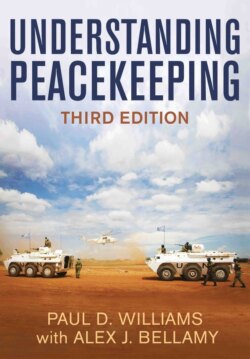Читать книгу Understanding Peacekeeping - Alex J. Bellamy - Страница 24
Box 1.2 The global cultural determinants of peace operations
ОглавлениеPeacekeeping agencies and their member states are predisposed to develop and implement strategies that conform with the norms of global culture, and they are disinclined to pursue strategies that deviate from these norms. In short, the design and conduct of peacekeeping missions reflect not only the interests of the key parties and the perceived lessons of previous operations, but also the prevailing norms of global culture, which legitimize certain kinds of peacekeeping policies and delegitimize others … [G]lobal culture constrains … peacekeeping by limiting the range of strategies that peacekeepers can realistically pursue. Peacekeeping agencies seem willing to rule out normatively unacceptable strategies a priori without even considering the potential effectiveness of these strategies as techniques for fostering peace, which is the stated goal of peacekeeping; and concerns about international propriety appear, at least on some occasions, to take precedence over considerations of operational effectiveness. (Paris 2003: 442–3, 451)
A second variant is Séverine Autesserre’s work on the culture underpinning what she calls ‘Peaceland’ – the ideational world inhabited by international peacebuilders in which expatriates from a multitude of different countries have come to share ‘a common collection of practices, habits, and narratives that shape their every attitude and action’ (2014: 1–2). Autesserre’s ethnographic approach shows how the everyday cultures of foreign peacekeepers, peacebuilders and aid workers have cohered to create a ‘politics of knowledge’ about how to build peace in foreign lands. The culture of Peaceland is reinforced by the tendency to bunkerize the deployment of foreign personnel and keep them generally separated from the locals via various security procedures. It also often dismisses local expertise and instead privileges personnel who possess technical, thematic knowledge. And yet, ironically, many of the organizations that comprise Peaceland operate with a ‘culture of secrecy’. Autesserre concludes that the seemingly mundane elements of Peaceland’s everyday culture have a significant impact by inhibiting the effectiveness of peace operations.
